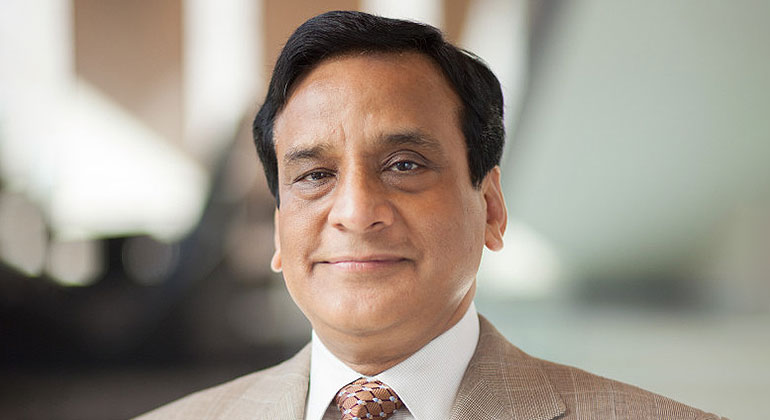First Time-Ever Highest Safety Rating Awarded to Three Interventional Cardiologists at The Mount Sinai Hospital
The Cardiac Catheterization Laboratory of Mount Sinai Heart at The Mount Sinai Hospital made history by being the first hospital in New York State ever to have three of its interventional cardiologists receive the highest "two-star" safety rating from the New York State Department of Health for its percutaneous coronary interventions (PCI).
Drs. Samin Sharma, Annapoorna Kini, and George Dangas were each awarded the highest two-star safety rating for PCI’s, while performing a total of 7247 PCI cases over the three year period of 2011-2013. Dr. Sharma was the only one of two interventional cardiologists in New York State to receive the highest two-star safety rating in two categories of both non-emergency and emergency cases.
This marks the 18th consecutive year the Mount Sinai Catheterization Laboratory or its physicians have been awarded a prestigious two-star designation for safety rates significantly exceeding the statewide average.
"At Mount Sinai Heart's Cardiac Catheterization Laboratory our patients’ safety is our number one concern," says Dr. Sharma, a leading interventional cardiologist who is Director of Clinical and Interventional Cardiology at The Mount Sinai Hospital. "We have an 18-year-long track record of offering the highest level of patient safety in New York State, and this record highlights the very best of cardiac care excellence here at Mount Sinai."
The new data released by the Department of Health reports on the outcomes of patient discharges at all 61 statewide cardiac catheterization labs from 2011-2013. The report, titled "Percutaneous Coronary Interventions (PCI) in New York State 2011-2013,” tracked PCI data in overall, non-emergency, and emergency cases.
During this period, Mount Sinai's Cardiac Catheterization Laboratory achieved a significantly higher safety level than the statewide average even while performing the largest number of PCI procedures in New York (13,906). Mount Sinai's risk-adjusted mortality rate, or RAMR, for all cases (0.75 percent) was significantly lower than the statewide average (1.04 percent). Also, the mortality rate for non-emergency cases (0.49 percent) was significantly lower than the statewide average (0.68 percent).
Data comparing New York State’s top 10 volume centers shows that Mount Sinai was the only New York State hospital to have an overall RAMR significantly lower than the statewide rate in two categories, and one of only two hospitals to have a significantly lower RAMR for non-emergency cases. Mount Sinai Hospital’s readmission rates was also significantly lower that the statewide average.
"This report measures the high-quality patient care and successful results our team of skilled interventional cardiologists and staff has been able to offer our patients each and every day at the Mount Sinai Cardiac Catheterization Laboratory," says Dr. Kini, Director of the Cardiac Catheterization Laboratory at The Mount Sinai Hospital.
"I could not be any prouder of Dr. Sharma, Dr. Kini, Dr Dangas and our Cardiac Catheterization Laboratory team. They are true leaders in the field of interventional cardiology," says Valentin Fuster, MD, PhD, Director of Mount Sinai Heart and Physician-in-Chief of The Mount Sinai Hospital. "Patient safety and effectiveness continue to drive this team of highly skilled cardiologists to ever greater levels of quality every year.”
PCI, also known as angioplasty, is a minimally invasive procedure performed inside a catheterization laboratory. It is used to diagnose and treat patients with heart disease or blocked heart arteries. A thin catheter is threaded through the body, typically from an artery in the groin to a blocked vessel in the heart. A diagnosed blockage can be removed, often with a stent that is inserted to restore blood flow to the heart within the blood vessel. The condition of patients entering a cardiac catheterization laboratory can range from non-emergency cases of patients experiencing early heart disease symptoms to emergency cases with patients suffering a myocardial infarction or heart attack.
About the Mount Sinai Health System
Mount Sinai Health System is one of the largest academic medical systems in the New York metro area, with more than 43,000 employees working across eight hospitals, over 400 outpatient practices, nearly 300 labs, a school of nursing, and a leading school of medicine and graduate education. Mount Sinai advances health for all people, everywhere, by taking on the most complex health care challenges of our time — discovering and applying new scientific learning and knowledge; developing safer, more effective treatments; educating the next generation of medical leaders and innovators; and supporting local communities by delivering high-quality care to all who need it.
Through the integration of its hospitals, labs, and schools, Mount Sinai offers comprehensive health care solutions from birth through geriatrics, leveraging innovative approaches such as artificial intelligence and informatics while keeping patients’ medical and emotional needs at the center of all treatment. The Health System includes approximately 7,300 primary and specialty care physicians; 13 joint-venture outpatient surgery centers throughout the five boroughs of New York City, Westchester, Long Island, and Florida; and more than 30 affiliated community health centers. We are consistently ranked by U.S. News & World Report's Best Hospitals, receiving high "Honor Roll" status, and are highly ranked: No. 1 in Geriatrics and top 20 in Cardiology/Heart Surgery, Diabetes/Endocrinology, Gastroenterology/GI Surgery, Neurology/Neurosurgery, Orthopedics, Pulmonology/Lung Surgery, Rehabilitation, and Urology. New York Eye and Ear Infirmary of Mount Sinai is ranked No. 12 in Ophthalmology. U.S. News & World Report’s “Best Children’s Hospitals” ranks Mount Sinai Kravis Children's Hospital among the country’s best in several pediatric specialties.
For more information, visit https://www.mountsinai.org or find Mount Sinai on Facebook, Twitter and YouTube.

Samin Sharma, MD, Named Director of the Mount Sinai Cardiovascular Clinical Institute
Nov 28, 2022 View All Press ReleasesMount Sinai’s Cardiac Catheterization Labs Given Highest Safety Ratings in New York State
Sep 08, 2020 View All Press ReleasesCoronary Stent Patients May Not Need Long-Term Aspirin
Sep 26, 2019 View All Press Releases